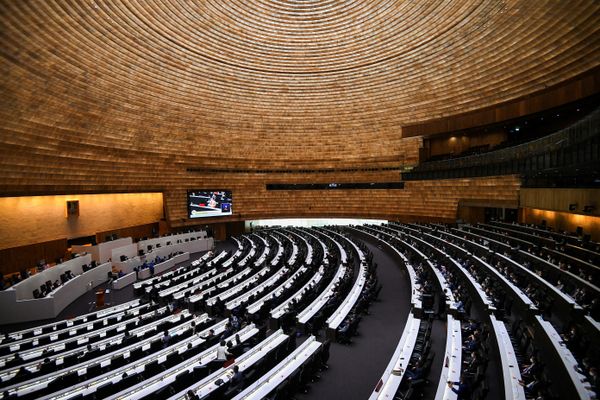BANGKOK, Aug 7 — Thailand's Constitutional Court will rule on two politically charged cases next week which will decide the fate of Prime Minister Srettha Thavisin and the popular opposition party, amid heightened uncertainty over potential upheaval.
Both cases underline intractable rifts in Thai politics, defined by a two-decade struggle between its powerful conservative-royalist establishment, backed by the military, and parties with mass appeal like Move Forward and Srettha's ruling Pheu Thai.
What is the case against Move Forward?
The court will rule today on an election commission complaint seeking Move Forward's dissolution over its campaign to reform a strict law on royal insults that protects the monarchy from criticism.
The complaint followed a January decision by the same court on the constitutionality of Move Forward's campaign, which it ruled was tantamount to an attempt to overthrow the system of government with the king as head of state.
Move Forward rejects that but has since dropped the campaign on the orders of the court.
The party has 30 per cent of house seats after it won last year's election but was blocked by conservative lawmakers from forming a government.
[caption id="attachment_367285" align="aligncenter" width="1035"] Move Forward Party Leader Pita Limjaroenrat reacts as he attends a voting session on the day of the second vote for a new prime minister, at the Parliament in Bangkok, Thailand, on July 19, 2023. — Picture by REUTERS[/caption]
Move Forward Party Leader Pita Limjaroenrat reacts as he attends a voting session on the day of the second vote for a new prime minister, at the Parliament in Bangkok, Thailand, on July 19, 2023. — Picture by REUTERS[/caption]
What happens if Move Forward is dissolved?
If Move Forward is disbanded, 11 current and former party executives, including Pita Limjaroenrat, who led the party to victory in the election, could be banned from politics and prohibited from forming a new party, likely for a decade.
Last month, Pita told Reuters he was hopeful his party would survive the case. It maintains the election commission's complaint was unlawful because it did not follow its own regulations.
If the party is disbanded, its surviving 143 lawmakers will keep their seats and are expected to re-organise into another party, as they did in 2020 when its predecessor Future Forward was dissolved over a campaign funding violation, which was among the factors behind massive anti-government street protests.
However, dissolution may impact the movement's influence in Parliament, as bans on its executives would see the removal of its ally and former member Padipat Suntiphada as first Deputy House Speaker.
What is the case against PM Srettha?
Srettha could be dismissed by the court on August 14 after conservative senators alleged he violated the constitution by appointing to cabinet a former lawyer who was once jailed, whom the senators said did not meet ethical requirements.
Pichit Chuenban, a former lawyer for the politically powerful Shinawatra family — the founders of Srettha's party — was briefly imprisoned for contempt of court in 2008 over an alleged attempt to bribe court staff, which was never proven.
Srettha denies wrongdoing and says Pichit, who resigned from Cabinet, had been thoroughly vetted.
[caption id="attachment_367286" align="aligncenter" width="998"] Thailand's Prime Minister Srettha Thavisin arrives to welcome Brunei's Sultan Hassanal Bolkiah at the Government House in Bangkok, Thailand, on April 29, 2024. — Picture by REUTERS[/caption]
Thailand's Prime Minister Srettha Thavisin arrives to welcome Brunei's Sultan Hassanal Bolkiah at the Government House in Bangkok, Thailand, on April 29, 2024. — Picture by REUTERS[/caption]
What if Srettha is dismissed?
Tycoon Srettha's case is among factors that have heightened political uncertainty and roiled financial markets in Thailand, Southeast Asia's second-largest economy, which he has struggled to revive, with delays in implementing his signature handout scheme amid falling popularity.
If Srettha is removed, a new government must be formed and Pheu Thai would need to put forward a new candidate for premier to be voted on by parliament, with no guarantees it will succeed.
The vote could pit Pheu Thai against coalition partners, or lead to concessions in return for parliamentary votes, both of which could result in a shakeup of the governing alliance and a realignment of cabinet and policies.
Who could be PM if Srettha exits?
Only those designated prime ministerial candidates by their parties prior to the last election can be nominated for premier.
Those include Paetongtarn Shinawatra, the ruling party leader and daughter of influential billionaire Thaksin Shinawatra, former Justice Minister Chaikasem Nitisiri, Interior Minister cum Deputy Premier Anutin Charnvirakul, Energy Minister Pirapan Salirathavibhaga, and former army chief Prawit Wongsuwon, a former deputy premier who was involved in two coups.
— Reuters
[caption id="attachment_319459" align="aligncenter" width="1148"] People walk outside the Parliament in Bangkok, Thailand, on July 19, 2023. — Picture by REUTERS[/caption]
People walk outside the Parliament in Bangkok, Thailand, on July 19, 2023. — Picture by REUTERS[/caption]




